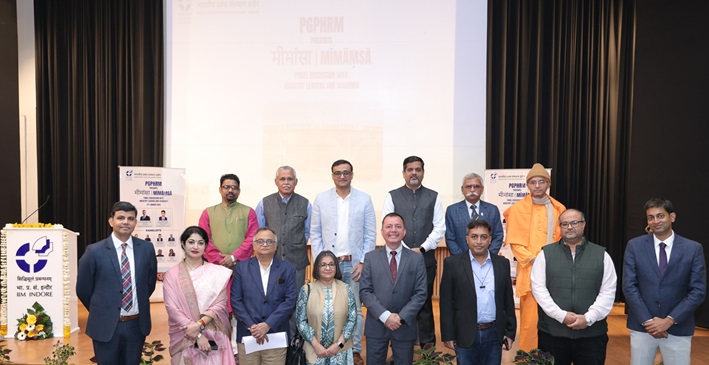Mimamsa, a panel discussion fostering collaboration between industry leaders and academia, took place on January 27 at IIM Indore. Hosted by the Post Graduate Programme in Human Resource Management (PGPHRM), the event brought together experts from diverse fields in both industry and academia, providing a platform for insightful discussions. IIM Indore’s Director, Prof. Himanshu Rai, inaugurated the event. Prof. Nishit Sinha, Chair – PGPHRM, was also present on this occasion.

In his inaugural address, Prof. Himanshu Rai eloquently delineated the multifaceted challenges confronting modern organizations, encapsulating a spectrum ranging from technological adaptation to the nuanced dynamics of workforce diversity and engagement. Emphasizing the paramount importance of embracing technological advancements, he said, “The real challenge, lies not in the displacement of employees by AI, but rather in equipping individuals with the requisite skills to navigate the evolving landscape”. Prof. Rai shared insights on the imperative of nurturing an inclusive environment, transcending geographical and generational boundaries, where individuals of diverse backgrounds collaborate harmoniously. He illuminated the critical nexus between employee engagement, meaningfulness, and organizational retention, emphasizing the essence of aligning individual motivations with broader workplace objectives. Addressing the labyrinth of regulatory compliance, particularly pertinent in the startup ecosystem, Prof. Rai threw light on the emergence of robust governance structures to ensure adherence to legal frameworks. “It’s time to understand the complexities of remote work management, elucidating the intricacies of performance evaluation and leadership paradigms in a distributed work environment”, he said. Prof. Rai envisaged a transformative shift in leadership ethos, advocating for a holistic approach anchored in emotional intelligence, reflective listening, and profound self-awareness. He espoused the ethos of ethical decision-making, wherein the moral compass guides individuals towards principled choices, transcending the dichotomy of modality.
In his welcoming address, Prof. Nishit Sinha articulated the profound essence of Mimamsa as a platform for socially conscious and contextually relevant dialogue, in line with IIM Indore’s mission. “We need to understand the necessity for introspection and view Mimamsa as a reflective journey to discern the pathways ahead,” he said. With foresight, he highlighted the evolving responsibilities of future HR managers, poised to navigate the integration of emerging technologies like AI within educational and corporate realms.
Under the adept moderation of Prof. Amitabh Deo Kodwani, the first panel discussion, “The Evolving Landscape of HR Decision-Making: Unleashing the Power of AI,” featured distinguished panelists: Ms. Ruchi Sharma, VP and Head HR at InterGlobe Aviation; Ms. Namrata Gill Tyagi, VP HR at Dr. Reddy’s Laboratories; and Mr. Sumit Ranjan, Executive Director at JP Morgan. Ms. Sharma emphasized AI’s pivotal role in revolutionizing HR functions such as recruitment, analytics, and training, backing for its integration to streamline administrative tasks and bolster decision-making processes. Ms. Tyagi elaborated on HR career trajectories, stressing the significance of technology while preserving the human touch in people-centric roles. Mr. Ranjan delved into AI’s potential to address unconscious biases and drive innovation, emphasizing its necessity for organizational adaptation and growth. The discussion highlighted the imperative of striking a harmonious balance between technological advancement and human-centric HR practices to navigate the evolving landscape of organizational success.
The second panel on “Performance Management in the VUCA World: Redefining Success Metrics” featured Mr. Abhishek Tiwary, Senior VP HR at Tech Mahindra; Mr. Sumit Neogi; and Mr. Anindya Kumar Shee, VP HR at RIL. Mr. Neogi stressed tailoring performance management to dynamic business needs with data-driven objectivity. Mr. Tiwary highlighted integrating performance processes into company culture, introducing “BANI” alongside addressing biases. Mr. Shee focused on stakeholder integration, and emphasizing credible employee reviews for legal considerations. Each brought valuable insights, enriching the discourse on adapting metrics in volatile environments. This session was moderated by Prof. Ranjeet Nambudiri.
The third panel discussion, moderated by Prof. Nishit Sinha, focused on “Navigating Educational Frontiers: Exploring Contemporary Pedagogical Trends”. The panelists collectively illuminated the evolving landscape of education. Among them were Dr. Shriram Nerlekar, Education Director at Ahmedabad Education Society; Prof. Simrit Kaur, Principal of Shri Ram College of Commerce; Prof. John Varghese, Principal of St. Stephen College; and Prof. Gyantosh Kumar Jha, Principal of Atmaram Sanatan Dharma College. Dr. Nerlekar offered invaluable insights into innovative pedagogical approaches and advocated for educational transformation through technology, stressing the teacher’s pivotal role. Prof. Varghese emphasized the purpose of education, delving into NEP 2020’s visionary changes, such as the Academic Bank of Credit and internationalization. Prof. Kaur connected pedagogy, technology, and NEP, discussing their impact on research. Prof. Jha highlighted teachers’ adaptation to technology and new assessment methods, acknowledging infrastructure challenges hindering NEP implementation.
The fourth panel discussion, “Innovations in Education: Shaping the Cognitive Horizon,” moderated by Prof. Prakriti Soral, featured a diverse array of perspectives. Swami Kamalasthananda, Principal of Rama Krishna Mission Vivekananda Centenary College, Kolkata, brought spiritual and philosophical insights, advocating for an adaptive mindset and setting common goals. Prof. Poonam Verma, Principal of Shaheed Sukhdev College of Business Studies, New Delhi, emphasized the multifaceted purpose of education, including interpersonal skills, while AI handles routine tasks. Dr. Rajesh Iyer, Senior Faculty at St. Xavier’s College, Ahmedabad, explored AI’s role in bridging industry-education gaps, stressing experiential learning and addressing implementation challenges. Dr. Neera Pant, Senior Faculty at Gargi College, New Delhi, highlighted ethical awareness in data creation, the importance of AI literacy, and human intervention in the data loop. Together, they illuminated innovative approaches shaping the future of education.
The event concluded with a resounding resonance of insight and inspiration as each panel delved into the intricacies of their respective topics. Attendees were treated to a wealth of knowledge and practical wisdom, leaving them with a newfound appreciation for the evolving landscapes of education and human resource management.


